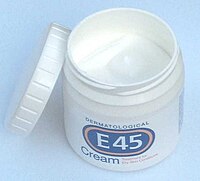
Photo from wikipedia
Innovation in materials specially formulated for additive manufacturing is of great interest and can generate new opportunities for designing cost-effective smart materials for next-generation devices and engineering applications. Nevertheless, advanced… Click to show full abstract
Innovation in materials specially formulated for additive manufacturing is of great interest and can generate new opportunities for designing cost-effective smart materials for next-generation devices and engineering applications. Nevertheless, advanced molecular and nanostructured systems are frequently not possible to integrate into 3D printable materials, thus limiting their technological transferability. In some cases, this challenge can be overcome using polymeric macromolecules of ionic nature, such as polymeric ionic liquids (PILs). Due to their tuneability, wide variety in molecular composition, and macromolecular architecture, they show a remarkable ability to stabilize molecular and nanostructured materials. The technology resulting from 3D-printable PIL-based formulations represents an untapped array of potential applications, including optoelectronic, antimicrobial, catalysis, photoactive, conductive, and redox applications.
Journal Title: Polymers
Year Published: 2022
Link to full text (if available)
Share on Social Media: Sign Up to like & get
recommendations!